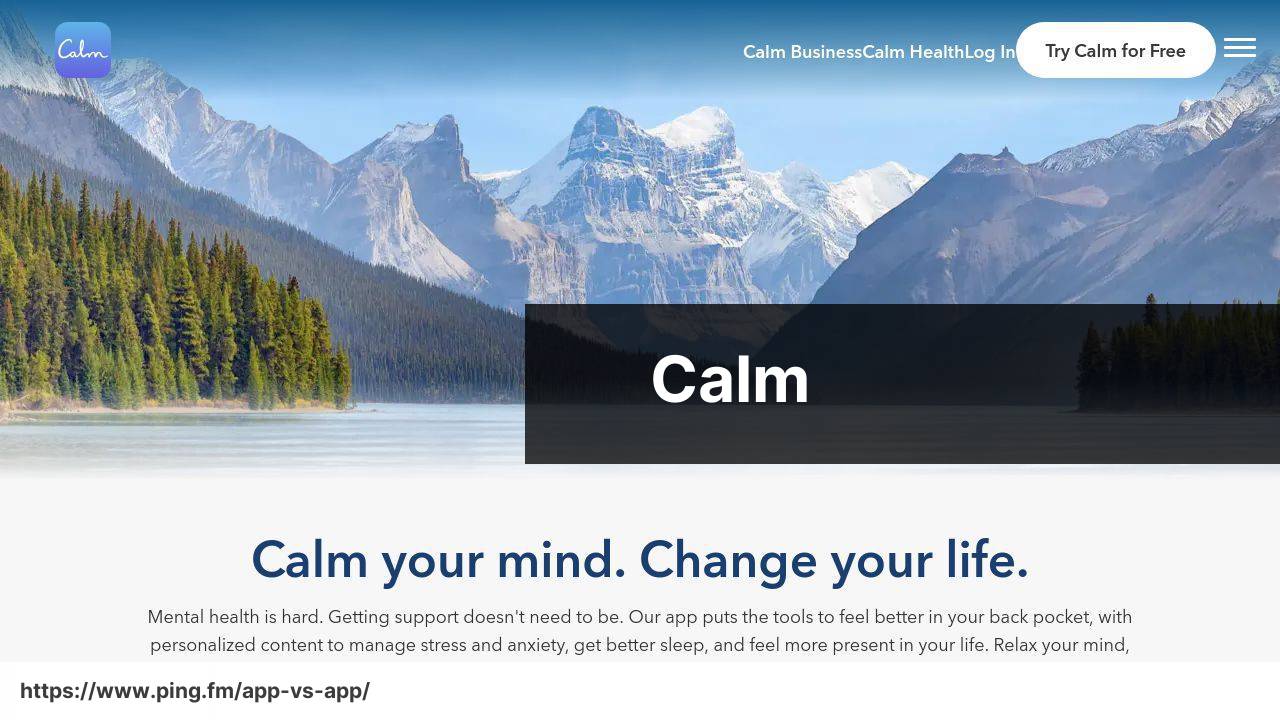Last update on
Headspace vs Calm (best free meditation apps / software)
Compare | Winner | |
| Ease of use | ||
| Variety of meditations | ||
| Quality of instruction | ||
| Unique features | ||
| Free content | ||
| Premium content | ||
| User Interface | ||
| Community Support | ||
| Offline Access | ||
| Personalization | ||
| FREE / PAID | Calm also uses a freemium strategy. The premium subscription costs $14.99/month, with unlimited access to all features and daily updates. | Headspace operates on a freemium model. It costs $12.99/month for premium access, which provides unlimited access to all meditations and courses. |
| Conclusion | Calm offers a wide variety of meditations and stories for all levels, with beautiful calming visuals and audios . Yet, it might be costly for unlimited access . | If you’re new to meditation, Headspace makes it easy to get started with beginner-friendly programs and a fun, engaging style . However, it comes with a higher price tag . |
Calm Pros & Cons
Wide range of meditation topics
Soothing sleep stories
Features famous voices
Beautiful visual and audio design
Offers masterclasses
Headspace Pros & Cons
Great for beginners
Engaging animation guides ️
Varied meditation programs
Sleeping aids
Celebrity meditations
Physical and mental exercises ♀️
Pricey premium subscription
Limited free meditations
You need to pay for masterclasses
No community interaction
Limited offline access
Lacks personalization options
More expensive compared to others
Less free content
Need continuous subscription for access
Limited community support
Requires strong internet connection
Other best free meditation apps
Insight Timer is great for advanced meditators with its extensive library of free meditations 📚. However, its user interface might be overwhelming for beginners 😵.
10% Happier differentiates itself with a unique approach focusing on skeptics, featuring well-known meditationteachers 🎓. However, it is quite expensive 💸.
Smiling Mind is a free meditation app designed to help build mental health resilience 🧠. Despite being free, it lacks variety and advanced features ⚙️.
FAQ
What are some of the best free meditation apps available on the market?
What is Headspace and what features does it offer?
Headspace is a top-rated mindfulness and meditation app that offers a wide range of guided meditations, sleep stories, breathing exercises, and mindfulness exercises. It also features a learning center with informative courses about mental health and well-being.
How much does Headspace cost after the free trial?
After the free trial, Headspace offers a few payment options. You can subscribe monthly for $12.99, annually for $69.99, or get a lifetime subscription for $399.99.
What are the features of the Calm app?
Calm is another highly-rated meditation app. It offers a variety of guided meditations, sleep stories, breathing programs, masterclasses, and relaxing music. It also features a daily calm program that you can follow to maintain your mental health.
How much does the Calm app cost after the free trial?
After the free trial ends, Calm charges $69.99 for an annual subscription. They also provide a lifetime subscription for $399.99.
What are the pros and cons of Headspace?
Users often appreciate Headspace for its user-friendly interface, variety of content, and expertly-guided meditations. However, it’s less budget-friendly than some other apps, and much of the content is inaccessible without a paid subscription.
What are the pros and cons of Calm?
Calm is praised for its extensive content library, including its award-winning sleep stories. Its daily calm feature is also popular among users. On the downside, the cost can be a deterrent for some people, and the app may not offer as much educational content as other services.
Can these apps help reduce anxiety?
Yes, both Headspace and Calm apps are designed with features like guided meditations and breathing exercises that can help manage and reduce anxiety.
How often should I meditate with these apps?
To reap the full benefits of meditation and mindfulness, aim to use these apps daily. You can start with shorter sessions of 5-10 minutes and gradually increase the time as you become more comfortable with the practice.
Can these apps improve sleep quality?
Yes, both Headspace and Calm include sleep stories and sleep meditations designed to help improve the quality of your sleep.
Do Headspace and Calm have child-friendly content?
Yes, both Headspace and Calm offer content tailored for children, including sleep stories and meditations.
What languages are supported by Headspace and Calm?
Headspace and Calm both support multiple languages including English, Spanish, French, German, and more.
Do these apps offer offline access?
Yes, both Headspace and Calm offer the option to download content for offline use, which is especially useful if you’re traveling or have limited internet access.
What devices are compatible with Headspace and Calm?
Headspace and Calm are compatible with iOS and Android devices. They also allow access through their respective websites for computer use.
Can the content on these apps be personalized?
Yes, both Headspace and Calm allow you to personalize your journey by choosing specific topics or areas of focus for your meditations.
Is it necessary to have any prior experience in meditation to use these apps?
No, both Headspace and Calm are very beginner-friendly. They provide simple, step-by-step guides for those new to meditation, making it an easy start for beginners.
How can I cancel my subscription if I decide the app is not for me?
If you wish to cancel your Headspace or Calm subscription, you can do so from the account settings on their respective websites or through your account on the App Store or Google Play Store, depending on where the subscription was originally purchased.
Are these apps secure and protect user privacy?
Yes, both Headspace and Calm adhere to strict privacy policies. They also employ security measures to safeguard user data. It’s always recommended to review their privacy policies for in-depth understanding.
Do these apps offer any free content?
Yes, both Headspace and Calm offer free content. Although much of their content is behind a paywall, they do provide some free resources, including a number of guided meditations and training courses.
Can people with mental health disorders also use these apps?
Yes, people with mental health conditions can use these apps. However, they’re not a substitute for professional mental health treatment. If you’re dealing with mental health issues, it’s recommended to consult with a healthcare professional.
What free meditation apps are considered the best in the current market?
Several apps lead the meditation industry in terms of quality and user experiences, with Headspace and Calm topping the list due to their comprehensive features and user-friendly interfaces.
Can you tell me more about features of the free version of the Headspace app?
Headspace’s free version provides basic content including foundational meditation courses, a few guided relaxation exercises and daily meditations for maintaining mindfulness throughout the day.
What does the free version of Calm have to offer to its users?
In its free version, Calm provides users with timed meditation options, access to several soothing sleep stories, a small variety of breathing exercises, and a daily ‘Calm’ feature.
How much do the premium versions of Headspace and Calm cost?
The premium version of Headspace costs $69.99 per year or $12.99 per month, while Calm’s premium subscription is priced at $69.99 per annum or $14.99 per month.
What additional features are available in Headspace’s paid subscription?
Headspace’s premium subscription allows access to a wider range of meditation programs tailored for different situations, sleep sounds, music, and animated videos teaching techniques for mindfulness.
What unique offerings does the Calm’s premium subscription provide?
With Calm’s premium subscription, users can unlock a vast library of guided meditations, sleep music, masterclasses by mindfulness experts, and a wide selection of nature sounds for relaxation.
Is there a trial period on Headspace and Calm apps?
Yes, both Headspace and Calm apps offer a 7-day free trial period for their premium versions.
Is it easy to navigate in the Headspace app?
Yes, the interface of the Headspace app is quite user-friendly, with clear labels and intuitive navigation, making it easy for users to find the right mindfulness practices for their needs.
How is the user experience in the Calm app from a navigation perspective?
The user interface of Calm is also very intuitive and designed in a way that lets users easily navigate through its features and contents.
Do Headspace and Calm apps offer content for kids?
Yes, both Headspace and Calm have content specifically designed for children to help them improve concentration, cope with fears, and get a better night’s sleep.
Which devices are compatible with Headspace and Calm apps?
Both Headspace and Calm are compatible with iOS and Android devices and are available for download on the App Store and Google Play Store.
Can I use Calm and Headspace offline or do I need an internet connection?
Calm and Headspace premium versions both have offline access feature which allows users to download their desired content for meditation and relaxation without an internet connection.
Is there any aspect of personalization in Headspace and Calm apps?
Yes, both Headspace and Calm offer personalized content recommendations based on users’ stress levels, sleep patterns, and mindfulness goals. They also have options to adjust meditation durations according to user preferences.
Are the meditation practices in Headspace and Calm suitable for beginners?
Yes, both apps are ideal for beginners. They provide basic courses that give a thorough understanding of meditation and mindfulness, guiding beginners through daily practices to develop these skills.
How regularly do Calm and Headspace update their content?
Calm and Headspace are dedicated to updating their content regularly, adding new mindfulness exercises, sleep stories, music, and more to ensure users don’t run out of refreshing experiences.
Are there any social sharing features in Headspace and Calm?
Yes, both Headspace and Calm have social sharing features that allow users to share their progress and favorite mindfulness exercises with friends and family through various social media platforms.
Do Headspace and Calm apps have integrations with other fitness or wellness apps?
Yes, both Headspace and Calm are integrated into several fitness applications including Apple Health, allowing users to synchronize their meditation data with overall wellness tracking.
What makes Headspace stand out among other meditation apps?
Headspace stands out due to its use of animation for making the meditation practices more engaging and easy to understand, especially for beginners.
What is unique about Calm that draws a lot of users to it?
Calm’s unique offering of ‘Sleep Stories’ – bedtime stories for adults designed to aid in achieving better sleep quality, makes it a fan favorite among meditation apps.
 ping.fm
ping.fm 

